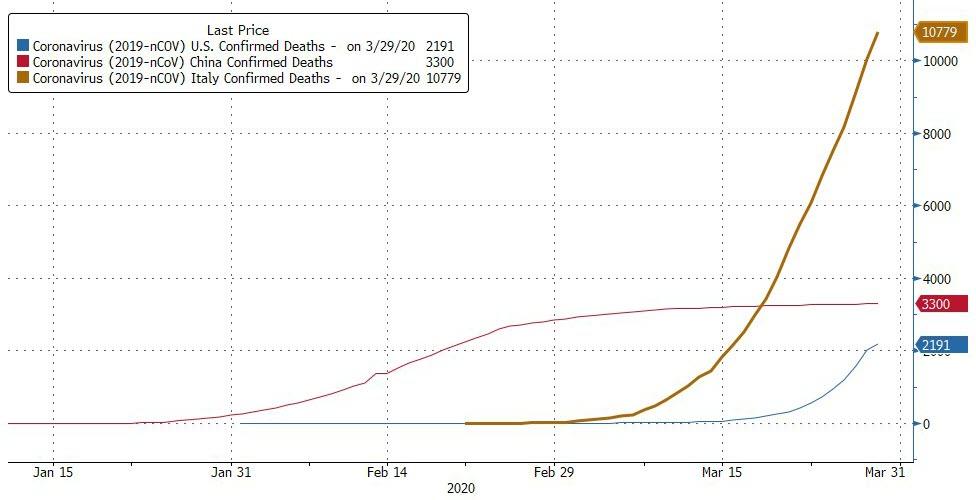via TheAmericanConservative.com,
When countries are turning to China because their supranational institutions won’t help, that’s a problem…
The COVID-19 pandemic has taken a greater toll on Italy than any other nation. The Italians are facing their most severe crisis since the Second World War, with Lombardy in the industrial north particularly hard hit. Yet for all its rhetoric about global citizenship and solidarity, the European Union has all but abandoned them.
The coronavirus first appeared in Italy on January 31 when two Chinese tourists from the Hubei province tested positive in Rome, eight days after they’d landed at the Milan airport in Lombardy.
The two were immediately isolated and quarantined in the Roman Spallanzani hospital, and the situation seemed under control—until February 21. That day, Italy confirmed 16 new coronavirus cases, 14 in Lombardy and two in Veneto. A 38-year-old Italian from Codogno near Milan with acute respiratory symptoms was identified as patient zero. Despite Italy’s attempts to contain the virus by locking down the city of Codogno, coronavirus infections spread.
In just a few days, Italy had the highest number of infections in Europe, with Lombardy as the pandemic’s epicenter. To avoid the spread of infections to the rest of Italy, the government locked down the entire region of Lombardy and other areas in northern Italy, effectively quarantining 17 million people.
A few days later, as the situation deteriorated, the whole of Italy was declared an “orange zone”—all “non-essential” commercial activities were shut down and the free movement of citizens was limited to grocery and pharmaceutical shopping and work obligations deemed by the state as of “prime importance.”
The economic repercussions of a complete shutdown loomed large. Consequently, Italy asked the EU for more flexibility on its accounts and requested that emergency measures be deployed to support Italian citizens and businesses. At the time, the crisis was hardly felt in the European powerhouses, France or Germany.
The EU’s response was slow and inefficient, and Italians started to feel abandoned by European institutions. As the original signer of the Treaty of Rome, Italy is a founding member of the EU and the third largest economy in the eurozone.
On March 12, the president of the European Central Bank (ECB), Christine Lagarde, marked a point of no return—she gave a highly anticipated speech outlining the measures the bank would introduce to combat the effects of the coronavirus. Lagarde decided not to cut interest rates, arguing against the policy of “whatever it takes,” as had been outlined by former ECB president Mario Draghi. To Italians, the EU’s indifference was a betrayal. The consequences of her words were immediate—and disastrous for Italian stocks. Even the pro-EU president of the Italian Republic, Sergio Mattarella, released a harsh statement asking the EU to correct its ways in the “common interest” of Europe.
The coronavirus emergency has exposed the failures and flaws of the European Union, while underscoring the importance of nation-states. In Europe, we’ve observed a series of events that have demonstrated the collapse of the supra-national model. First, the borders shut down—Austria and Slovenia acted unilaterally, without asking approval from Italy’s government. The move was also symbolic: Italy was not only isolated, it was abandoned to its own devices.
Globalization may have its efficiencies, but an overwhelmed health care system suffers in the absence of internal production of the necessary materials—life-saving ventilators, infection-preventing hazmat vests, face masks. The global evolution of supply chains exported manufacturing and relied heavily on the cheap imports of essential products from abroad.
But with the spread of the coronavirus, many states are now forbidding the export of medical equipment. A good example is Turkey, a country that readily accepts EU funds and that many liberals would like to bring into the Union. Ankara blocked a shipment of 200,000 face masks already purchased by Italy for the hard-hit northern regions of Marche and Emilia Romagna.
The Italians are coming together to fight the pandemic. Many Italian companies have converted production at home: those working in the textile industry have started producing face masks. Italy’s only manufacturer of respiratory equipment, in the province of Bologna, is not able to meet the current needs and relieve the national shortage of ventilators. Army technicians are now helping to increase production capacity.
What has the coronavirus in Italy taught us so far? A great nation is doing what it can to become self-sufficient as the crisis proves daily that the propaganda of the prophets of globalization is false. We see that there are strategic sectors, such as health care, transport, energy, defense, and telecommunications, that have to be considered from the perspective of national security and not strictly business.
This is a new, unspoken understanding that unites Italy today. We have witnessed a return of patriotism: flags are hanging from windows and Italians are singing the national anthem. But there is something else to consider: our freedom. Some politicians, including former prime minister Matteo Renzi, are proposing to monitor the movements of individuals using their phones and data from telecommunication companies to police compliance with the lockdown rules and assess penalties for violations.
This smacks of the Big Brother surveillance state. The collection of metadata for statistical ends, as practiced in Lombardy, should be separated from the indiscriminate control of individual citizens. Otherwise an Orwellian precedent will be set. Such an anti-democratic attitude seems to be one of the collateral ideological effects of what President Trump refers to as a “Chinese virus.”
Meanwhile, we are witnessing a dangerous government narrative born out of an emotional response to Chinese “help” in a time of crisis. This narrative, increasingly uncritical of communist China, turns a blind eye to Chinese long-term foreign policy aims and the fact that its help is tantamount to the arsonist helping to put out the fire he started. Only recently did the Chinese government sent medical assistance to Italy—and a propagandist’s camera to capture the event. But no gesture should whitewash the responsibility of the Chinese Communist Party.
According to The South China Morning Post, the first case of coronavirus in China can be traced back to November 17, while the Chinese government publicly admitted the existence of the epidemic on January 12, almost two months later.
Nor should we forget the incompatibility between China’s values and our own, their human rights violations and denial of liberty and democracy. When Mike Pompeo called Italian Foreign Minister Luigi Di Maio to emphasize the closeness between the United States and Italy, he also cautioned Italy about its relationship with China, saying, “the day will arrive in which we will evaluate how the world responded” to Beijing’s propaganda. Despite Pompeo’s clear warnings, the Italian government appears unaware of China’s overt imperial ambitions in Europe.
It is too soon to draw long-term economic conclusions from the coronavirus pandemic, but it is clear that those who reacted best are nation-states with the freedom to manage their borders and fiscal policy. When this emergency ends, the legitimacy of EU institutions will no doubt be questioned.
But there is another path Italy may choose: intensifying bilateral relations with the United States, becoming the nexus of commerce in the Mediterranean, increasing its presence in the Balkans and Eastern Europe, and reclaiming its role as a center of Christianity and Catholicism in the world.











